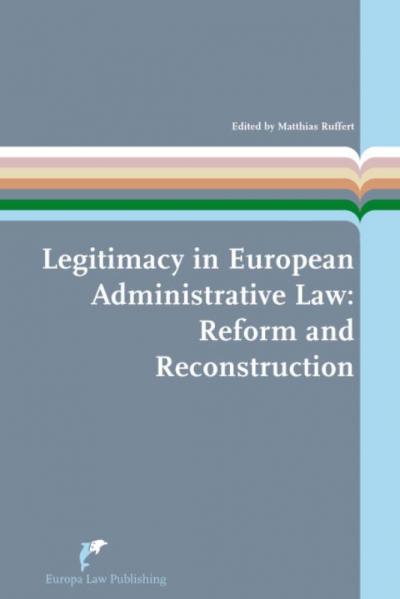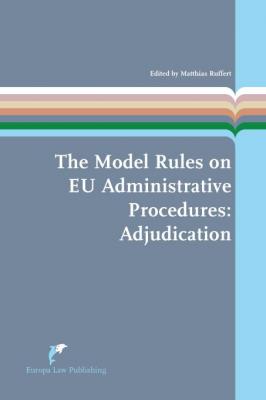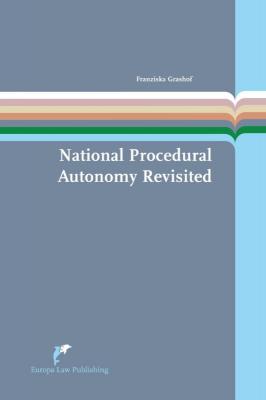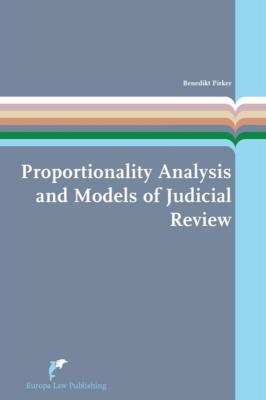Administrative Law has been the object of thorough reforms in the various European jurisdictions. This process of transformation has considerable impacts on administrative legal scholarship in the respective countries. Profound changes in administrative activity have established new forms of administrative institutions which raise issues of legitimacy. Besides the consensus that administrative law, administrative activities and administrative institutions have to be legitimate, the concept of legitimacy with respect to a common European framework is more than ambiguous. An analysis of the concept of legitimacy in the different national legal systems promises valuable results for a discussion on the European Union level. Although the respective jurisdictions have different starting points with respect to issues of legitimacy, common sources can be detected. This is necessary in shaping and analyzing administrative law in European Union. This volume comprises the results of the third workshop of the Dornburg Research Group of New Administrative Law which took place in Paris in October 2009. The Dornburg Research Group of New Administrative Law was founded at Dornburg Castle near Jena, Germany, in 2005. Its purpose is a long-term transnational exchange of ideas between administrative law scholars from European jurisdictions.
Matthias Ruffert is Professor of Public Law, European Law and Public International Law at the Friedrich-Schiller Universität Jena, Germany. He initiated the Domburg Research Group and is co-leading it with Pascale Gonod, Université de Paris I, Panthéon-Sorbonne, and Andrew Le Sueur, Queen Mary College, University of London.
Acknowledgements
Contents
Chapter 1 Legitimacy in Administrative Law: Reform and Reconstruction
Pascale Gonod
1 Introduction
1.1 Claim (or Expectation)
1.2 Decomposition
2 Forms of Legitimacy
2.1 Deepening of Democratic Legitimacy
2.2 Development of Participative Legitimacy
2.3 A Procedural Legitimacy?
Chapter 2 Legitimacy in Administrative Law? A French Perspective Jacques Caillosse
1 Understanding the Question
1.1 What Does ‘Legitimacy’ Actually Mean?
1.2 Administrative Law on the Issue of Legitimacy
1.3 Conclusions on ‘Legitimacy in Administrative Law’
2 What Response(s) are Provided by French Administrative Law?
2.1 From Legitimation through Law…
2.2 …to de-Legitimation through Management?
3 Potential Developments
Chapter 3 People as ‘Users’ and ‘Citizens’ The Quest for Legitimacy in British Public Administration
Andrew Le Sueur
1 Introduction
1.1 Outline
1.2 Concepts of Legitimacy
2 The British Constitutional Context
2.1 Power from ‘We, the people’ in Britain?
2.2 Two Spheres of Legitimacy: the Micro and the Macro
3 Is there a Legitimacy Crisis in Britain?
4 Micro Legitimacy in the Individual Sphere: USERS
4.1 The User Perspective Agenda
4.2 The ‘Principles of Good Administration’ Agenda
5 Macro Legitimacy in the Collective Sphere: Participation
5.1 Identification of Problems and Policy Formation (Stages 1 and 2)
5.2 Providing Legal Authority for Policy (Stage 3)
5.3 Questions of Institutional Design
6 Closing Comments
Chapter 4 Legitimacy and Accountability as a Basis for Administrative Organisation and Activity in Germany
Eberhard Schmidt-Aßmann
1 Introduction
2 What is Government (‘Staatsgewalt’)?
3 What is People (‘Volk’)?
4 What does ‘Derives’ (‘geht aus’) Mean?
4.1 Legitimation as Personal-Organizational Legitimacy
4.2 Legitimation in Matter and Content
5 The Idea of a Sufficient Level of Legitimacy (‘Legitimationsniveau’)
6 Some Current Problems
6.1 Independent Agencies
6.2 Privatization
7 Perspectives: Legitimacy and Accountability in European Context-Some Remarks
Chapter 5 Legitimacy and Accountability in Italian Administrative Law. A Critical Analysis
Giacinto della Cananea
1 Distingue Frequenter
2 The Legitimacy of Administrative Action: Three Constitutional Models
3 ‘Power from the People’ – Rhetoric and Reality
4 The Obsession for Legality and its Drawbacks
5 From Legality to Legitimacy: The General Principles of Law
6 Procedural Legitimacy
7 Accountability as Responsibility
8 Accountability, Performance and Transparency
9 Institutional Constraints on Political Power: Independent Authorities
10 Accountable to None? Public-Private Corporations
Chapter 6 The Legitimacy of the Administration in Spain
Francisco Velasco Caballero
1 Administration, Democracy and the Constitution
1.1 Methodological Plan
1.2 Spanish Public Administration
2 The Diversity of Legitimacy Arguments: Law, Political Theory and Administrative Science
2.1 Political Theory: the Concept of Democracy
2.2 Administrative Science: Effectiveness and Participation
3 Levels of Constitutional Legitimacy
4 Forms of Legitimacy
4.1 Legality as a Criteria of Legitimacy
4.2 Parliamentary Control
4.3 Citizen Participation
4.4 Submission to the Direction of Government
4.5 Objectivity and Efficacy in the Service of the General Interest
5 Special Analysis of some Types and Forms of Administration
5.1 Independent Administrations
5.2 Corporate Administration
5.3 Mixed Administration
5.4 Local Administration
Chapter 7 Legitimacy Issues in Administrative Law. Historical Approach, Constitutional Approach, Fact-Finding Approach to Responsibility from a Swedish Perspective
Gunilla Edelstam
1 Introduction
2 Legitimacy and Monarchy
2.1 Legitimacy of the King in Ancient Times
2.2 Legitimacy of the King Today
2.3 Legitimacy at the Decline of the Power of the Monarchy
3 Legitimacy and Democratic Constitution
3.1 Introduction
3.2 Legislation ad Legitimacy
3.3 Application and Legitimacy
4 Legitimacy and Facts
4.1 Introduction: Questions of Law and Questions of Facts
4.2 Fact-Finding
4.3 Responsibility
5 Concluding Remarks
Chapter 8 The History of Legitimate Administration in Europe
Juli Ponce Solé
1 Introduction
2 The Bureaucratic Paradigm
3 New Public Management
4 Governance
5 Quality of Administrative Action: The Right to Good Administration and Procedural Legitimacy
6 Quality of Administrative Action
7 Good Administration and Good Governance: Administration and Democratic Legitimacy
Chapter 9 Democracy, Legitimacy and Accountability – is there a Common European Theoretical Framework?
Roberto Caranta
1 Foreword
2 The Democratic Nation-State and its Administration
3 The Weak Spots in the Paradigm
4 Improvements to the Paradigm or an Alternative Paradigm?
5 Shortcomings of the New Paradigm – and of some of its Institutions – and their Cure
6 The Quest for Legitimacy and Accountability in the EU
7 Conclusions
Chapter 10 Legitimacy in Administrative Law: European Union
Paul Craig
1 Formal Legitimacy
2 Legitimacy and Legal Accountability
2.1 Availability of Judicial Review
2.2 Targeting Judicial Review
3 Legitimacy and Political Accountability
4 Legitimacy and Substantive/Output Accountability
4.1 The CAP and the Structural Funds
4.2 Utilies Regulation
5 Conclusion
Chapter 11 Historical and Prospective Views on Comparative Law as a Tool to Build a Framework for Legitimacy in Europe
Susana de la Sierra
1 Introduction: The Transformation of Administrative Law as a Transformation of Powers
2 Administrative Law through Time from a Comparative Perspective: A Tentative Chronology
2.1 The Precedents of Administrative Law
2.2 The ‘French Legal Empire’ as a Model of Reference
2.3 The Administrative Law of the Welfare State and the Incorporation of other ‘Foreign Elements’
2.4 Globalisation as a North American Approach
3 Some Questions for the Comparative Analysis
3.1 The Particular Forces of Specific Legal Orders: The Concept of ‘Legal Diplomacy’
3.2 Globalisation of Language, Globalisation of Concepts?
3.3 The Import of Legal Concepts and the Assumption of Political and Constitutional Contexts
4 What Legitimacy?
5 A Look into the Future: Farewell to the Weberian Administration?
Chapter 12 The Legitimacy of Administration: German Ideas and how they are Received in France
Patrice Chrétien
1 A German View of the Question of Democratic Legitimation of the Administration in France
1.1 ‘In France, the question of democratic legitimation of the administration is not really discussed’
1.2 ‘In practice, democratic legitimation of the administration is nonetheless fragile…’
2 The German Theory of Democratic Legitimation of Administration
2.1 General Observations
2.2 The Fragility of the Democratic Principle
Chapter 13 Problems of Legitimacy in Contracting-Out and Privatisation
Catherine Donnelly
1 Introduction
2 Experience of Contracting-Out in the UK and Ireland
2.1 UK
2.2 Ireland
3 Input Legitimacy
3.1 Constitutional Legitimacy
3.2 Democratic Legitimacy
4 Output Legitimacy
4.1 Efficiency and Effectiveness
4.2 Accountability
5 Enhancing Legitimacy of Contracting Out and Privatisation
6 Conclusion
Chapter 14 Legitimacy: From Politics to Expertise and Public Opinion?
Dawn Oliver
1 Introduction
2 Politics, Politicians and Legitimacy
3 The UK Experience
3.1 The Regulation of Politicians’ Decision Making
3.2 Depoliticisation and the Immunisation of Decisions from Politics
3.3 The Balancing of Participation and the Public Interest
3.4 A Case Study: The UK Planning Act 2008
4 Why the Difference between the UK and other Countries?
5 Constitutional Narratives
6 Political Style, Culture and Traditions
7 Summary and Conclusions
Chapter 15 Legitimacy and Accountability: Integration and Compensation
Athanasios Gromitsaris
1 Introduction: Structures and Descriptions of European Integration
1.1 Structural Tensions
1.2 Descriptions and Normative Standards
2 Thesis
3 The Institutionalization of Cooperation, Competition and (Mutual-) Control of the Agents of European Integration
3.1 Institutional Balance and Hierarchy of Norms
3.2 Comitology and Delegated Legislation
3.3 Creation of Institutions
3.4 Informality and Illegality
4 Institutionalization of the Tension between Information and Resources
4.1 Uncertainty and Dependence
4.2 Information Gathering and Monitoring
4.3 Management of Resources, Budgets, and Government Control
5 Generating Confidence through Institutionalizing Distrust
5.1 Mutual and Reflexive Supervision Processes
5.2 Rules on Correct Rule Application
5.3 EMU Conditionality, ‘Vincolo Esterno’ and Conflict of Legitimacies
6 Institutionalization of the Tension between Person and Institution
6.1 Rationales for Participation
6.2 Feelings of Right and Legal Enforceability
6.3 Union Citizenship: A Surprise Package
6.4 Public Scrutiny and ‘Transcendence’
7 The Role of Judicial Review
7.1 Principles Necessary in a Democratic Society
7.2 Keeping Authorities within Legal Bounds
7.3 Proportionality: The EU as an Amorphous Sand-Heap of Market Participants? The Tension between Market-Oriented Liberties and Democratically Legitimated National Institutions
7.4 Rights to effective Judicial Remedies for the Citizen in the Context of Integrated Administration
8 Legal Practical and Institutional Rationality
8.1 Practical Rationality of Legal Institutions and Rationality of Sciences
8.2 Agent Sensitive Institutions and Interest Group Representative Democracy
8.3 Institutional Linkages and the Channels of Democratic Input in the EU
8.4 Calculability and External Enforcement of Expectations
8.5 Accountability and Law
8.6 Administration as Market Economy and Routinized Charismatic Authority
9 Conclusion: Belief in the Rational Resolvability of the Guiding Tensions Underlying the Nexus of Law and Politics as Legitimacy
9.1 Hierarchy, Heterarchy, Synarchy, Polyarchy and Polycephalous Physiognomy of the EU
9.2 Accountability to ‘idées directrices’, and Guiding Tensions
Chapter 16 Comparative Perspectives of Administrative Legitimacy
Matthias Ruffert
1 The Legal Meaning of Legitimacy in Administrative Law
1.1 Legitimacy in Legal Terminology
1.2 Legitimacy between Constitutional and Administrative Law
1.3 Legitimacy and its Plethoric Terminology
2 Legitimacy, the Democratic Principle, and beyond
2.1 Legitimacy and Forms of Government
2.2 Legitimacy and the Democratic Principle
3 Unfolding Legitimacy in Administrative Law 359
4 Legitimacy Controlled 360
5 Conclusion 360









